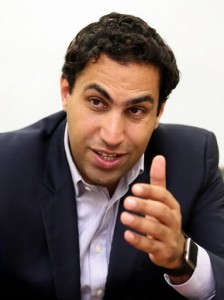Junior writers interview U.N. Secretary-General’s Envoy on Youth in Hiroshima
Sep. 18, 2015
Participation of young people is vital for advancing nuclear abolition
Junior writers from the Chugoku Shimbun, who gather information and write articles on peace-related issues with the aim of advancing a world without nuclear weapons and war, interviewed Ahmad Alhendawi, 31, the U.N. Secretary-General’s Envoy on Youth, who paid his first visit to the A-bombed city of Hiroshima. Mr. Alhendawi stressed the importance of young people taking part in the policy-making process in order to create a more peaceful world. Below are highlights of the interview.
What are your impressions on your first visit to Hiroshima?
I studied about what happened in Hiroshima in school and read a lot about it. However, by visiting the Peace Memorial Museum and actually seeing the belongings, especially the belongings of those who died, I realized that this was something that happened not “far away” and not “long ago.” The devastation caused by the atomic bomb and the suffering it brought to human beings are beyond words.
And the threat of this happening again still exists, which has made me think how urgent it is for all of us to make efforts to abolish nuclear weapons.
What do you think young people can do to help realize a peaceful world without nuclear arms?
Today, half of the world’s population is made up of young people under the age of 25. “Peace and security” is one of the three main pillars of the Charter of the United Nations. Even though it is young people who are sent off to war and usually pay the highest price, historically, they have not been invited to take part in the policy-making process, which is the area controlled by politicians, military personnel, and experts. It’s now time to fix that. We shouldn’t assume that politicians and military experts will take the lead in nuclear disarmament and abolition.
Why? Because they have failed to do this for the past 70 years, and this is the reason young people should be involved in the political discussion.
However, we shouldn’t wait for society to come to this conclusion. Young people should speak up, both at home and abroad, about the significance of their role. It’s important for young people to raise their voices via social media and call on political leaders to invite them to take part in this discussion.
Many young people don’t show much interest in nuclear abolition or other social issues. How can we get them more interested in these issues?
To promote their engagement, you can use music, concerts, and social media to make these things more interesting. In addition to holding gatherings, you should try engaging other young people in a range of ways. Moreover, even if we have different views, politically, we all share common core values as human beings. Political differences should never permit us to dehumanize others and such differences should be resolved by sitting down together and talking.
Profile
Ahmad Alhendawi
Born in 1984, Mr. Alhendawi obtained a Master’s degree from the Institut Européen in France. He served as an Emergency Programme Officer at the non-governmental organization Save the Children. He also worked as a Team Leader for the World Bank funded programme to the League of Arab States on Institutional Development to Strengthen Arab Policy and Participation.
Junior writers’ impressions
I was very impressed by Mr. Alhendawi’s call for human beings to first discuss our core values and fundamental concerns, instead of starting with political issues. Because we go to school every day, we’re really not able to spend so much time talking with people around the world. Still, these words from Mr. Alhendawi were powerful enough to motivate me in my activities as a junior writer and I want to continue this work for some time to come. (Nozomi Mizoue, 16)
I was very glad that Mr. Alhendawi responded to our questions so sincerely, looking us in the eye and sometimes leaning toward us. I was also really relieved to see that he understands the people of Hiroshima in overcoming the tragedy of the atomic bombing and calling for world peace. He seems to have a deep understanding of the thoughts and feelings of the A-bomb survivors, which is what we most want to convey. I hope he will help spread the wish for peace of the people of Hiroshima as widely as possible. (Shiori Niitani, 16)
Keywords
U.N. Secretary-General’s Envoy on Youth
In his Five-Year Action Agenda in January 2012, U.N. Secretary-General Ban Ki-moon made “Working with and for Women and Young People” one of his top priorities. In January 2013, he appointed Ahmad Alhendawi of Jordan as the first Envoy on Youth.
(Originally published on September 7, 2015)








